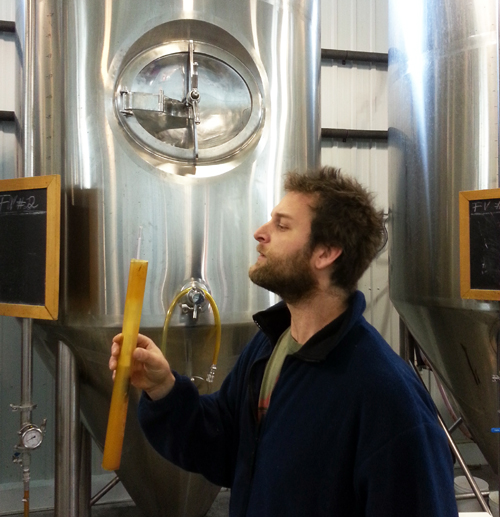
What do you get when you dump 1,500 oysters into a beer tank? A unique craft beer created by U of G grad Alex Nichols.
Nichols is the brewer for Barley Days Brewery in Prince Edward County, and experimenting with new beer recipes is his favourite part of the job.
“There’s a lot of opportunity to be creative when it comes to craft beer,” says Nichols, who completed a degree in biological science at Guelph in 2007.
He has been working with the small craft brewery near Belleville, Ont., for the past four years and has learned that the only way to compete against the large breweries is to be innovative.
“There is a big push in the craft industry to do something new,” says Nichols. “People drinking mainstream beer are sick and tired of the same old beer that the big companies produce, so they are coming to the craft sector for something new. We need to keep coming up with different beers so that people stay interested in our brand.”
His most recent creation is an Irish stout made with oatmeal and oysters.
“It’s a style derived from London in the early 1900s when the pubs would serve oysters from the Thames River as appetizers,” says Nichols. “The customers would drink beer while they ate the oysters, and eventually someone came up with the idea to blend the two.”
Pumpkin is another one of the interesting ingredients Nichols has added to his brews.
“I took a Belgium saison style beer, added 400 pounds of chopped up pumpkins and some pumpkin pie spice,” he says. “It tasted like liquid pumpkin pie.”
Nichols became curious about the art of brewing while at Guelph.
“I took industrial microbiology, which focused on fermentation technology for the synthesis of organic compounds like xantham, citric acid, wine making and brewing,” he says. “It was a very engaging course that directed me further to the field of brewing.”
Nichols wanted to pursue a career related to microbiology but also craved a job that was hands-on and provided him with a creative outlet.
“Brewing is a perfect blend of science, art and physical labour,” he says. “I apply science to my job every day. That is how you get consistency. But tapping into your artistic side is how you improve the product.”
After graduating from U of G, Nichols completed a master of science in brewing and distilling at Heriot Watt University in Edinburgh, Scotland.
“It’s one of the few master’s in brewing and distilling in the world,” he says. “It’s a really comprehensive course so you can hit the ground running once you graduate.”
Nichols worked for a year as an assistant brewer at Beau’s Natural Brewing Company near Kingston, Ont., before becoming the head brewer at Barley Days.
With just 10 employees working for the brewing company, Nichols handles everything from brewing to filtering to packaging.
“I’m a jack of all trades,” he says. “If something breaks down, I have to figure out a way to still make it work.”
While he does do specialty brews, Nichols’s main focus is ensuring the brewery’s three regular beers – a dark ale, a pale ale and a pilsner style lager – have an appealing and consistent flavour.
When he started at Barley Days, Nichols was given the liberty to enhance the flavours of the company’s current brews. There are hundreds of different types of malts and more than 80 varieties of hops. Part of a brewer’s skill is to not only blend complimentary varieties together, but to also achieve the right balance, says Nichols.
However, changing the flavour of a beer doesn’t necessarily require changing the ingredients. Even slight variations in conditions such as fermentation temperature can have an impact, adds Nichols.
“You have to make gradual changes from batch to batch so your customers don’t notice. It took me a year to get the pilsner lager the way I wanted it.”
Ingredients and brewing process are two key factors in making a good-tasting beer, but Nichols says if you let oxygen or any foreign microorganisms into the process, even the perfect brew can taste bad.
“Having a sterile environment is the most important part of brewing. Any foreign bacteria in your equipment can potentially ruin your batch.”
Nichols brews about 150,000 litres of beer a year. He says one of the biggest challenges about working for a small-scale brewery is forecasting how much to make from month to month.
“Brewing is a very energy- and resource-intensive process, so you can easily sink yourself into a financial hole if you brew too much. But if you don’t make enough then you could lose customers. Maintaining a sustainable brewery is definitely the hardest part of the job.”